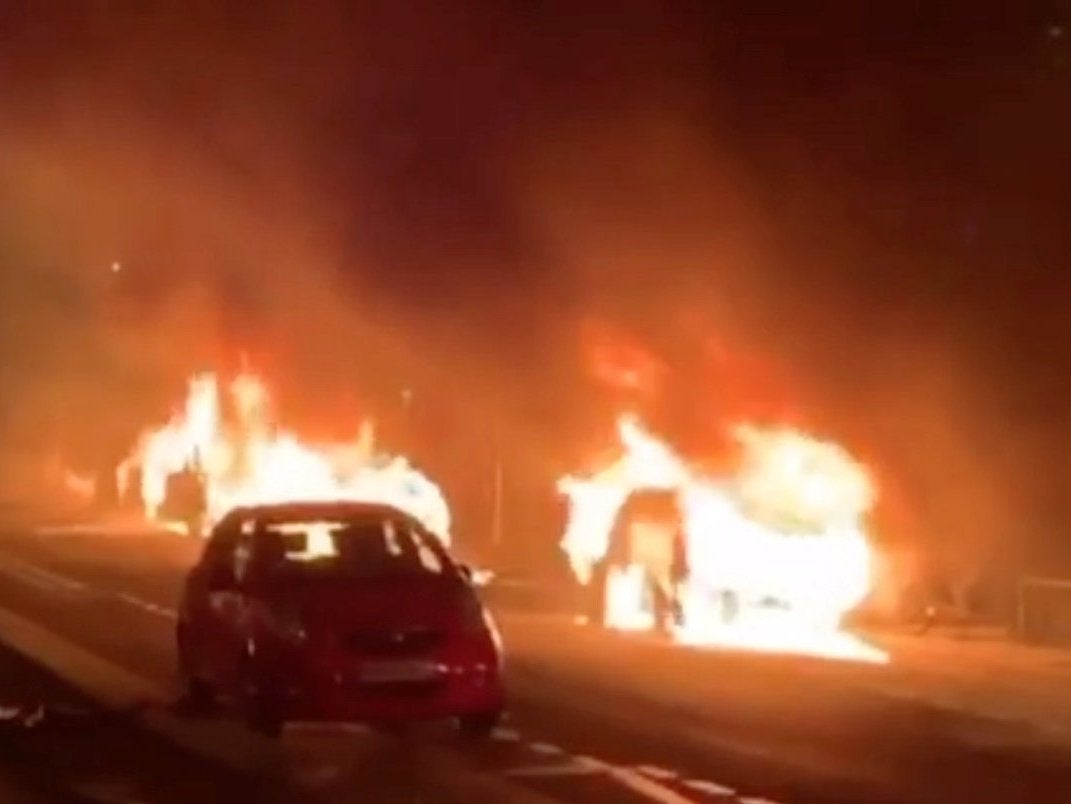Police fire tear gas as crowds of yellow vest protesters target French media companies and set cars alight
Seventh week of protests sees fewer demonstrators on streets but violence still flares

Protesters in France have marched on the headquarters of various French media organisations, with groups taking to the streets in small groups in Paris and across the country.
Now in its seventh week, the gilet jaunes (yellow vest) protests have shrunk somewhat but hundreds of demonstrators, some chanting “fake news” and “journalists – collaborationists”, and others hurling stones, descended on the offices of TV network BFM and the state-run France Televisions.
Police in riot gear intervened, leading to skirmishes, with officers eventually using tear gas to disperse those on the streets and making a number of arrests. Despite a lower turnout than at previous protests demonstrators still caused havoc, with some setting fire to a number of cars in central Paris leaving streets choked by fumes.
Some protesters have accused the media of supporting French president Emmanuel Macron’s government and big businesses.
But news outlets have consistently given the protests prominent coverage since they erupted on 17 November.
In Marseille, around 900 protesters marched, chanting “Macron out”, police said.
In Paris, dozens of protesters twice tried to march on the tourist-filled Champs-Elysees, which has been the site of repeated clashes between police and demonstrators in recent weeks.
Another small group of demonstrators gathered near the Eiffel Tower, where several were arrested.
But by nightfall, tourists and couples were back at the adjacent Trocadero plaza to enjoy spectacular views of the tower.
Around 50 demonstrators who had arrived at the medieval fort of Bregancon, on the Riviera coast near Toulon on Thursday, remained nearby on Saturday.
They shouted ‘Macron resign’ as they tried to get into the heavily armoured building, where they claim Mr Macron, is enjoying a holiday with his wife, Brigitte.
Bregancon has been a particular target for anti-government protests since the summer, after Mr Macron risked burnishing his protester-given reputation as “president of the rich” by installing a 34,000 Euro (£31,000) swimming pool there for family members who did not want to swim in the sea.
Both police and protesters appeared to be out in significantly smaller numbers than on previous weekends.
The holiday season and winter chill may have put a damper on Saturday’s turnout, along with a raft of concessions by Mr Macron to calm the movement after rioting nearly reached his presidential palace earlier this month.
Despite the president’s offers of tax relief and other aid, many people remain frustrated with his pro-business leadership and are continuing to stage roadblocks at roundabouts around the country.
Peaceful gatherings were held on Saturday in several cities, including Albertville in the Alps and Rouen in Normandy.
Protesters continued blocking roundabouts in several sites, causing traffic delays and letting just a few cars through at a time on a busy weekend of holiday travel. They brandished French flags and placards with a range of demands.
Further protests are expected on the Champs-Elysees on New Year’s Eve, when Paris puts on a light show typically attracting large crowds of spectators.
Paris police plan extra security for the annual event, which has previously seen violence flare-up after midnight.
The yellow vest movement began following anger over fuel tax hikes, but grew to encompass broader anger over Mr Macron’s economic policies.
It’s named after the fluorescent protective vests French motorists must legally keep in their cars.
Last Saturday almost 150 arrests were made for public order offences in Paris alone.
Mr Macron has backed down on his proposed charges on petrol and diesel, which were intended as a measure to cut emissions.
He has also vowed to increase the national minimum wage by 7 per cent, and said employers would be encouraged to give an end of year tax-free bonus to employees.
However, the yellow vests have pledged to continue protesting indefinitely until more concessions are extracted from the president, whose popularity rating has now sunk to just 18 per cent.

Support free-thinking journalism and subscribe to Independent Minds
Agencies contributed to this report
Join our commenting forum
Join thought-provoking conversations, follow other Independent readers and see their replies
Comments
Bookmark popover
Removed from bookmarks